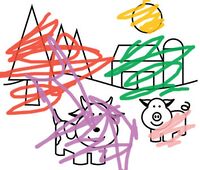Pre-Market Economy
The Pre-Market Economy is an economic system in which the production and distribution of goods and services take place through those aged from 2 to 12. However it generally refers to the Domestic Pre-Market Economy - one of the youngest and most rapidly growing economies in the business world, mainly due to its ingenious solutions to the economic problem.[1]. The economy is very fickle and constantly in fluctuation, rolling from Boom Time to Bust time and even, on occasion, Nap Time.
Operating in the Pre-Market Economy
Operating in the Pre-Market Economy can seem as easy as taking candy from a baby (well OK, technically embezzling). It is, however, surprisingly quite difficult, requiring shrewd business management, ambition and screaming... lots and lots of screaming.
Businesses are generally small, family run stands selling a variety of consumer goods for a very reasonable price. These can be found dotted around suburban street verges and throughout smaller learning institutions across the country.
There are many profitable industries in a typical economy; the lemonade market is an old favorite if a little too competitive, mud-pies and dead bugs are also in high demand. However, the lucrative glue market is currently in somewhat of a boom and will most likely reap dividends in the near future. Handicrafts are also quite good sellers, with textiles currently all the rage in the Asian Pre-Market Economy.
The financial market in the economy is quite well developed. The easiest place to find capital to start a business is a Dough and Attention Distributor (or DAD). With enough dealing, manipulation and red cordial the Financial Firm begrudgingly gives the required capital.. and an ice cream.. and a puppy.. and a pony.. and more ice cream.. and 2 hour custody visits on weekends...
Failing this, the little space behind the couch is also quite reliable.
Marketing is often focused solely on "word of mouth" despite the availability of many other conduits. Traditional methodology also includes the Peer Pressure technique, popular in most schools and amongst glue companies. Where competition is stronger, more adventurous entrepreneurs have employed all manner of advertising from slogans to promotions, however a dozen screaming customers all claiming they won the prize is hardly good publicity.
Prominent Regular-Market watcher and former child[2] Martin Goldstein recently commented on the Pre-Market Economy:
| “ | It is no surprise to me that children have developed their own economic system. I believe that us adults could learn something from these little scamps. Have you ever been at a board meeting and had your mind wander back to the days of the lemonade stand? In what way is selling, say, viagra like selling lemonade? Let your mind wander on that for a moment. You see? So many connections! Just read this recent company report - A bajillionty dollars - not since ENRON have we seen numbers like that. | ” |
Market Mechanisms

There are many mechanisms in the Pre-Market that keep the economy running properly. These often become jammed with mud and broken toys.
- Regulation - In all but the most neglected economies[3] there is a Regulatory Body. In most Pre-Markets the Regulatory Body intervenes rarely so as to keep its sanity - when they do intervene it is generally to prevent businesses from selling dangerous goods (Fred's Lemonade and Little Blue Pellets I Found in the Cupboard), uncompetitive behavior (Putting fake spiders on rival businesses) and to get them the hell off the couch!! In a Command Economy the Regulatory Body owns and controls everything and everyone better shut the hell up or go to their room!! This takes a loooot of Vodka to keep running.
- Cry & Demand - Not in this economy.
- Competition - Is heated to say the least. Standing out over the masses of rival stands takes skill... skill or a really big stick. Competition lasts until everyone becomes tired and lets the loudest one win - referred to as Monopoly Behavior, though technically it's more like Scrabble... or Politics.
- Cry & Demand - No.
- Pure Competition - Basically the same as regular competition except the prize is the "satisfaction of participation". That's what you get when you let evangelical Sunday schoolers into the market.[4]
- Cry & Demand! - NO!
- CRY AND DEMAAAAAAAND! - FINE!
Big Business & the Pre-Market Economy
Some large corporations can trace their roots back to the Pre-Market Economy. One such example is 7-Eleven (or 7-Eleventeen as it was originally known) which began operations on a humble suburban street curb. Originally offering the limited convenience of staying open "until bed time", 7-Eleven was soon able to expand into the fully fledged economy thanks to a very gullible Financial Firm. Sadly these successes are few and far between as 90% of businesses are liquidated within the first 3 days, though not quite as liquidated as the operator's pants.
Many large companies have attempted to break into the Pre-Market Economy, mostly with limited success. While they have large amounts of finance and are able to construct huge stands with a army of paper boy distributors, they are generally seen as bullies trying to screw the little guys and are never allowed around for play dates. One such example was the 2001 attempt of Coca Cola to break into the market. Coca Cola (flexing its muscle) ran a 27 million dollar ad campaign, hosted a 15 course caviar dinner and distributed a 110 page report detailing its numerous Nicaraguan stock holdings. However, competing businesses quickly spread a rumor that CEO Edward Neville Isdell was indeed a fatty fatty fat fat, destroying Coca Cola's public image. Coca Cola was promptly told to "go and pick on someone its own market capitalization" and subsequently got into a fist fight with Microsoft.
Other companies have attempted to open franchises in the Pre-Market, mostly in the furious sales period post Christmas. These received little interest after the first few days and found their way into the hands of the liquidators as "hand-me-downs".
One regular economist recently commented on the difficulties of the Pre-Market Economy:
| “ | The untapped potential of the Pre-Market Economy has been in the sights of the machine that is corporate America some time. So far they have been able to stave off even the most heavily supported attempts to enter the market... not even with candy were we able to win them over... and that even worked with the President! | ” |
Despite such fears, many boutique stores are reportedly on the verge of expanding into the Pre-Market. So, if all goes well, walking down the street and passing a Gucci Italian Grass Bracelet stand on the left and Purified 99% Dirt Free (not Wheat) Grass Juice stand on the right is not an unreasonable prospect.
Study of the Pre-Market Economy
A few prominent College Professors have performed in depth studies of the Pre-Market Economy, written many essays and taken many relevant pictures to study. The fruits of their labor can be found in many websites, journals and evidence lockers around the world. So far they have only been able to decipher some of the complex economic indicators:
|
|
|
|
Despite this success, most economic professors suggest leaving the economy to itself lest the Global economy get a massive headache.
The 2006 Little Golden Handshake book My First Quarterly Prospectus is generally considered to be the definitive guide to operating in the Pre-Market Economy. Sans this journal there are several other similar works that deal with the topic, however these are written in a series of unintelligible scribbles and juice stains, rendering them completely useless. Provided here are some excerpts from the first volume, considered the most informative.
My First Quarterly Prospectus
My First Quarterly Prospectus variously explores business expansion...
| “ | This business venture belonged to a rosy faced little boy, and that little boy's name was Billy. Billy looked after the venture very well. He would get up early every day and run out to refill its till, put up the sign and raise the price ever so slightly. The next morning revenue would be a tiny bit higher. And so the business grew
until it became the largest lemonade stand in the entire neighborhood. People would come from miles around to marvel at its spectacular profit margins and taste the sweet taste of success... Billy's lemonade wasn't half bad either. |
” |
Competition...
| “ | Billy has some new neighbors. Who are your new neighbors Billy? Bobby. Bobby and his lemonade business. Bobby and his lemonade business... with mud! Down
Market share is going down. Billy is sad. Bobby won't share. Bobby won't share the market. Billy has an idea. Billy has an idea and a proposition. Billy has an idea, a proposition and a rather large stick. Billy has a Hostile Takeover. Bobby doesn't like this proposition. Bobby doesn't like this proposition at all. Bobby tells fatty fat Billy where he can stick his stinking proposition- Billy crys "Defamation!". Billy's high street lawyer crys "Defamation!". Billy's governing authority crys "Defamation!" Bobby has to share. Bobby has to share the market. Bobby has to share the rewards. Billy says "no comment". Billy's high street lawyer says "no comment". The Governing Authority says "I need a drink" |
” |
and highly cliched endings...
| “ | Silly Billy. He should have known, even Sally knew 8 didn’t come after 3. But it was kind of unfair; he should have been able to charge extra for the mud he put in each lemonade. Oh well, this was the Pre-Market Economy and the juice market looked good with grandma coming over that afternoon. Those adults would buy almost anything! And they all lived profitably ever after*
|
” |
Notes
- ↑ usually just a good firm spanking
- ↑ At least he claims he was...
- ↑ Technically there is no intervention in a perfect Laissez Parent model and the economy effectively controls itself - generally called Drug dealing.
- ↑ At least they're not peddling children's bibles.
- ↑ Other Titles in this Series: My First Degree Murder Charge, 2006 - A guide to modern playground law.
| Featured version: 7 May 2008 | |
| This article has been featured on the main page. — You can vote for or nominate your favourite articles at Uncyclopedia:VFH. | |







